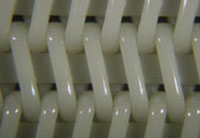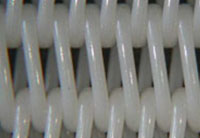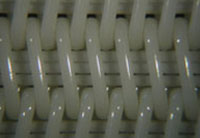
- Home
- Products
- About Us
- News
- Markets
- Contact Us
- honor
Products
SEPARATION FILTRATION TECHNIQUE SERIES MINING AND MINERALS SIEVE FILTRATION SERIES FGD FILTER BELT SERIES PAPER MAKING CLOTH SERIESPolyester Spiral Filter belts /Press Fiter Belt In Dewatering/Mineral/ Drying Processes
Spiral belts/Spiral Link Belt are produced by using of different technology than woven belts. Two neighbouring spiral coils in belt are connected together with monofilament yarn.
Spiral belt / Spiral Link Belt does not need extra seam (joint) like woven belts, because spiral coils at the both ends of the spiral belt can be connected together. Spiral seam on spiral belt is stronger and lifetime of this connection is in some applications more durable that clipper seam AISI316, which is used for woven belts. Therefore spiral belt could be a solution for applications, where woven belt with clipper seam prematurely fail.
Belt edges are standardly reinforced by strip of high mechanically resistant and flexible two component glue. High quality glue increases mechanical resistance of belt edges and holds the filling yarns strongly in fabric.
Spiral filter belts are usually made of abrasive resistant polyester, polyamide or Special PPS Monofilament Yarn.
Dewatering and filtration properties of spiral press Filter belts are related with its air permeability, which can be adjusted by inserting a suitable type of filler yarns inside the spirals. We offer spiral fabrics within the range of air permeability from 100 to 1,000 CFM.
Spiral Press Filter Cloth are especially suitable for dewatering of fibrous material (paper sludge, pulp) and sludge with a high content of inorganic particles (e.g. mining sludge, coal, sand), but they can also be used for dewatering of good quality digested municipal sludge. If the sludge has a high content of organic particles or if it is sticky and muddy, there is a risk of spiral fabric blinding.



Benefits
· Long service life
· Suitable especially for machines where belt deformation often occurs
· Abrasion resistant design
· No problems with the seam
· Smooth adhesive treated belt edges
· Suitable for fibrous sludges
Application:
· Dewatering of pulp and paper sludge
· Dewatering of industrial and municipal sludge in belt filter presses
· Dewatering of mining and abrasive sludge
· Thickening of sludge in gravity thickeners
· Forming belt for production of MDF boards
· Conveyor belts
Specifications:
CODE | Wire | Wire | Mesh count | Mesh count | Tensile | Air Permeability | Thickness | Weight |
3868A | 0.7 | 0.9 | 68 | 18 | 1650 | 3067 | 2.50 | 1700 |
3868B | 0.7 | 0.9 | 68 | 18 | 1650 | 5700+-500 | 2.50 | 1360 |
3252A | 0.5 | 0.8 | 96 | 22 | 1450 | 3500 | 1.95 | 1350 |
3252B | 0.5 | 0.8 | 96 | 22 | 1450 | 4500+-500 | 1.95 | 1100 |
4070A | 0.9 | 1.1 | 53 | 15 | 1800 | 3613 | 3.25 | 1870 |
4070B | 0.9 | 1.1 | 53 | 15 | 1800 | 6000+-500 | 3.25 | 170 |
Type A Means With Flat or Round Fillers Inside, Type B means without any fillers inside.